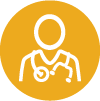Oftentimes, when an individual receives a cancer diagnosis, their thoughts turn toward their future and what the end of their treatment might reveal. However, the real challenge can be the immediate adjustments that need to be made before and during treatment. However, the reality of the changes can be overwhelming, these changes are necessary.
Patients at the Cecil B. Highland, Jr. & Barbara B. Highland Cancer Center at United Hospital Center, do not have to face this diagnosis alone. Nurse Navigators are trained nurses that help patients to make informed decisions about their treatment. Navigators work with patients and their families at every step of the cancer journey, by providing support and being available to answers questions or concerns.
How Do I Decide What Type of Cancer Treatment to Receive?
Your oncologist will provide you with treatment options based on national guidelines for your diagnosis and stage of cancer. The national guidelines are current recommendations for the prevention, diagnosis, and management of malignancies across the spectrum of cancer care. In collaboration with your oncologist, you will set forth a plan for your individual cancer care.
What Happens to My Health During Treatment?
Because chemotherapy kills both cancer and healthy cells, you may experience common side effects such as fatigue, anemia, hair loss, nausea and diarrhea. Side effects can be managed by medications prescribed by your oncologist. Depending on the chemotherapy drug being used for your treatment, your doctor may order tests to get a baseline of your heart and lung functions as some chemotherapies can affect organ function. Your navigator is here to help you with any changes that you may experience, as well as assist you in communicating your needs to your doctor.
How Do I Tell Others About My Cancer?
Ultimately, it is up to you how you share your story, or even if you choose to tell people at all. You may want to start with close friends or family members to see how it feels to talk about it with people you trust.
Another option is setting up a website or social media page that people can refer to and get the story of your journey, see updates, and/or donate money for medical expenses. By having a central location for information it will take the weight off you for having to continuously repeat your story to everyone you see.
However, when it comes to telling children, it is best to individualize the conversation based on their age, and on what they might already know or think, they know about cancer. Your navigator can help assist you in finding age-appropriate books for children to read about cancer and help them understand at their level what it means to know someone with cancer.
Do I Have to Share My Cancer Diagnosis With Others?
You certainly do not have to tell anyone if that is your choice. However, establishing a good support system can significantly make your cancer journey more bearable. While your healthcare team will provide the medical expertise to treat you, your personal support system is just as vital in helping you through your cancer journey as well.
Can I Still Work During Cancer Treatment?
You may still be able to work during your treatment depending on how your body responds to the chemotherapy and side effects. You could be too immunocompromised for your doctor to allow you to safely be around others and work. You may work on your off weeks of treatment, depending on your treatment schedule.
Will My Cancer Become My Entire Identity?
It might be inevitable that at some point in your journey, it will become your identity. How long should you anticipate, could vary from person to person. With a culture that has months, fundraisers, and ribbons dedicated to your new diagnosis, it is hard not to identify yourself once you have been diagnosed. For some people your treatment will cause hair loss; therefore, making it difficult to hide your situation.
Then one day your hair grows back and your energy returns. Suddenly, you realize that you no longer identify as a cancer patient, but rather as a rock star who can handle anything. Some people may find it therapeutic and empowering to identify long after the treatments have ended. They wear their ribbons proudly and shout their stories from the mountaintop. They can give newly diagnosed people hope, and help to continue the awareness through a survivor’s eye. Just remember it is your journey, do it your way, and do what is best for you.
How Can I Stay Positive During Treatment?
It may sound cliché, but having a positive attitude really is essential. Surround yourself with positive people, and try to distance yourself from anyone who brings negativity to your situation. Having cancer not only affects you physically, but also emotionally too. Taking care of your mental health by staying positive and having a good support system is as essential as getting your treatments. Sadness and anxiety are very normal emotions to feel during this time, even after you are done with treatment. Allow yourself to feel emotions, without letting these take over. Find a coping mechanism that you can rely on to get you back on track.
Find something worth fighting for, such as a “why”. Your “why” is somewhat like a goal, a reason you are going to fight. By finding a “why” you can make that your ultimate reason to keep fighting and staying positive. Make your “why” something that you can look forward to when your treatment is completed, or just milestones in your journey, like finishing radiation or your last chemotherapy treatment. An example of a “why” is, when I am done I will go to Disney World, buy that boat I’ve always wanted, walk your daughter down the aisle, or simply see the ocean and sit on the beach. Make it something worth fighting for when you do not think you can fight anymore. Make it your own, write it down and keep it dear to your heart.

For more information, visit https://www.cancer.gov/about-cancer/coping/adjusting-to-cancer This information is recommended by; Megan Westfall, RN, BSN, OCN, a nurse navigator at United Hospital Center. Learn more about the support provided by nurse navigators by visiting http://wvcancercenter.com/nurse-navigator.
Please note, the information provided throughout this site is not intended or implied to be a substitute for professional medical advice, diagnosis or treatment. All content, including text, graphics, images, and video, on or available through this website is for general information purposes only. If you are experiencing related symptoms, please visit your doctor or call 9-1-1 in an emergency.

